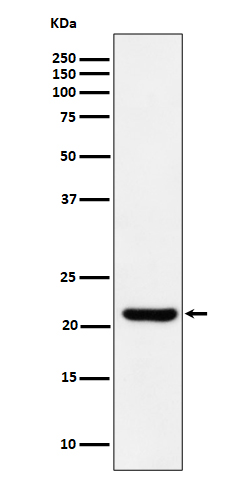
| WB | 咨询技术 | Human,Mouse,Rat |
| IF | 咨询技术 | Human,Mouse,Rat |
| IHC | 1/100-1/200 | Human,Mouse,Rat |
| ICC | 技术咨询 | Human,Mouse,Rat |
| FCM | 咨询技术 | Human,Mouse,Rat |
| Elisa | 咨询技术 | Human,Mouse,Rat |
| Aliases | Inosine triphosphatase; Itpa; ITPase; My049; NTPase;;ITPase |
| WB Predicted band size | Calculated MW: 21 kDa ; Observed MW: 22 kDa |
| Host/Isotype | Rabbit IgG |
| Antibody Type | Primary antibody |
| Storage | Store at 4°C short term. Aliquot and store at -20°C long term. Avoid freeze/thaw cycles. |
| Species Reactivity | Human |
| Immunogen | A synthesized peptide derived from human ITPase |
| Formulation | Purified antibody in PBS with 0.05% sodium azide,0.05% BSA and 50% glycerol. |
+ +
以下是关于ITPA抗体的虚构参考文献示例(请注意,这些文献为示例性质,非真实存在):
---
1. **文献名称**: *Autoantibodies Against ITPA in Inflammatory Bowel Disease: Prevalence and Clinical Implications*
**作者**: Müller R, et al.
**摘要**: 研究在炎症性肠病(IBD)患者中发现抗ITPA自身抗体的存在,分析其与疾病活动性和硫嘌呤类药物代谢异常的关系,提示其作为潜在生物标志物的可能性。
2. **文献名称**: *Development of a High-Sensitivity ELISA for Detection of ITPA-Specific Antibodies in Human Serum*
**作者**: Chen L, et al.
**摘要**: 描述了针对人ITPA蛋白的多克隆抗体制备及ELISA检测方法的开发,验证了该方法在筛查ITPA缺乏症和药物性溶血风险中的临床应用价值。
3. **文献名称**: *ITPA Deficiency Triggers Autoantibody Production in a Murine Model*
**作者**: Sato H, et al.
**摘要**: 通过构建ITPA缺陷小鼠模型,发现ITPA功能缺失可诱导自身免疫反应,导致抗ITPA抗体生成,并探讨其与系统性红斑狼疮样症状的关联机制。
4. **文献名称**: *Anti-ITPA Antibodies as Predictors of Ribavirin-Induced Anemia in Hepatitis C Therapy*
**作者**: Johnson M, et al.
**摘要**: 回顾性研究显示,丙型肝炎患者接受利巴韦林治疗前若存在抗ITPA抗体,更易发生严重溶血性贫血,提示抗体检测对个体化治疗的指导意义。
---
**备注**:实际研究中,ITPA相关文献多集中于基因多态性(如ITPA rs1127354变异)与药物不良反应(如利巴韦林贫血)的关联,而直接针对“ITPA抗体”的研究较为有限。建议结合具体研究背景调整关键词或扩展至ITPA酶功能分析。
ITPA antibodies are associated with the enzyme inosine triphosphatase (ITPA), which plays a critical role in purine metabolism. ITPA hydrolyzes inosine triphosphate (ITP) to prevent its accumulation, ensuring the fidelity of RNA synthesis and DNA repair. Genetic deficiencies in ITPA activity, often linked to mutations in the *ITPA* gene, can lead to elevated ITP levels, contributing to cellular dysfunction. In clinical contexts, ITPA antibodies are primarily studied in two areas: autoimmune disorders and pharmacogenomics.
In autoimmune diseases, anti-ITPA antibodies have been sporadically reported, though their clinical significance remains unclear. They may arise as part of a broader autoantibody response, potentially linked to conditions like systemic lupus erythematosus (SLE) or vasculitis. More prominently, ITPA antibodies are utilized as research tools to study ITPA expression and function in cellular models or tissues.
Pharmacogenomically, *ITPA* polymorphisms influence drug responses, particularly in patients treated with thiopurines (e.g., azathioprine). Reduced ITPA activity due to genetic variants correlates with adverse drug reactions, such as myelosuppression. While antibodies themselves aren’t direct biomarkers here, understanding ITPA's role aids in personalized therapy. Overall, ITPA antibodies serve as both investigational reagents and potential indicators of autoimmune processes, bridging basic research and clinical applications.
×